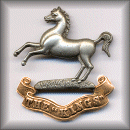















|
The Second Anglo-Boer War (1899-1902)
| A small number of the officers and men of the forerunners of the 9th King's, the 3rd and 6th Volunteer Battalions of the King's Liverpool Regiment, took part in the 2nd Anglo-Boer War in South Africa.
The 1st Volunteer service section went out to South Africa in January 1900 and arrived 29th March at Colenso where it joined the regular 1st Battalion of the King's Liverpool Regiment. The battalion took part in the operations in Natal & East Transvaal and at the action at Geluks Farm where two men of the King's Liverpool Regiment were awarded the Victoria Cross, Great Britain's highest gallantry award. The Service Company volunteers left South Arica in April 1901 and arrived home on 17th May. They had manned blockhouses in Elandsfontein and Springs for six months before leaving for home.
For details of individual officers and men of the Volunteer Service Companies of the King's Liverpool Regiment, from the Medal Rolls, click - HERE
As the Anglo-Boer War was such an important event throughout Great Britain and the Commonwealth, it was only to be expected that both local and national newspapers regularly reported the progress of the war, and in the case of local newspapers, the contribution to it made by local men. On the following page is a series of extracts from Liverpool newspapers which concern the Volunteer Service Companies of the King's Liverpool Regiment, their activities in South Africa, and the celebrations on their return - click HERE
|
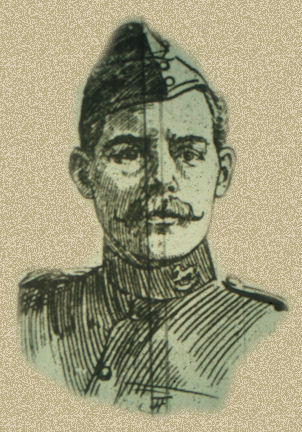 |

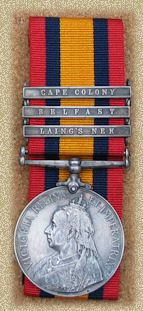 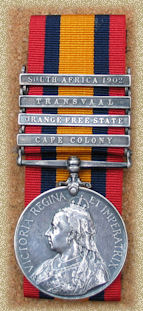
|
All officers and men of the Service Companies who served in South Africa were entitled to the Queen's South Africa medal. In addition to the medal, clasps were issued to denote where the men saw action. There are three types of clasp - 'Battle' clasps were awarded to men present at specific actions, 'State' clasps were awarded to denote service in various South African states and finally 'Date' clasps show that the recipient served in South Africa in either 1901 or 1902.
There are rules for the award of the clasps:
1. No state clasp can be awarded if the recipient has been awarded another clasp for an action that took place in that state.
- Belmont, Defence or Relief of Kimberley, Defence or Relief of Mafeking or Modder River occured in the Cape Colony
- Elandslaagte, Defence or Relief of Ladysmith, Talana, Laing's Nek and Tugela Heights occurred in Natal
- Dreifontein, Paardeberg, Wepener and Wittebergen occurred in the Orange Free State
- Belfast, Diamond Hill and Johannesburg occurred in the Transvaal
- There are no battle bars for Rhodesia
2. The Cape Colony and Natal clasps cannot be awarded together.
3. The date clasps are awarded if the recipient served less than 18 months in South Africa and was present in 1901 and/or 1902.
The above information concerning the rules for the award of the clasps is reproduced courtesy of 'The Boer War Register 1899-1902' which can be found by clicking here |
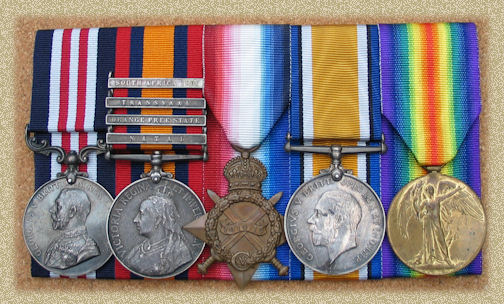
A Boer War/WW1 medal group awarded to a member of the 1st Volunteer Company, King's Liverpool Regiment who went on to serve with the 9th King's in the Great War.
|
|

